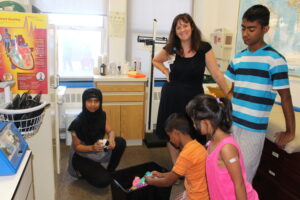HPS health program offered to all students, especially immigrants
By Alan Madlane
Sarah Peslar is a clinician with the Hamtramck School-Based Health Center, a DMC program that helps students in a number of health-related areas, particularly those students that are part of newly immigrated families.
We came to her with some questions about the program, and she made time to answer them for us.
The Review: First, let’s talk about the program that you are involved with. Tell us a bit about the 20-plus-year history of the Hamtramck School-Based Health Center (HSBHC) and its relationship with DMC Children’s Hospital of Michigan, please?
Sarah Peslar: HSBHC started in 2000. At that time, the school district was awarded a grant from the Michigan Department of Education to address the needs of the large refugee population, which, in those days, was primarily people coming in from Bosnia and Kosovo.
Hamtramck Public Schools decided that the students’ health needs were the greatest concern, and so a school board member at that time (and veteran nurse at Children’s Hospital of Michigan), Mary Renkiewicz, championed the cause.
The Review: Talk about the specific relationship between the program and Hamtramck Public Schools at the different levels. What are some of the more common services that you provide?
Peslar: We provide vaccines to all VFC (Vaccines for Children) Eligible students – Medicaid, Underinsured and Uninsured students.
We provide healthcare services, physical exams, hearing and vision screenings, sick visits, blood tests, lead tests and prescriptions to all uninsured students. We coordinate with school staff when there is a health concern regarding a student.
We have an eyeglass program that provides free eyeglasses for students, and have free therapy services available to high school students as well.
The Review: Has the nature of services changed with the changing demographics of the city over the past two decades? Is any of your work considered controversial, and, if so, how do you navigate that aspect of your service?
Peslar: We have seen children from over 48 different countries at our clinic, and have been able to adjust our services depending on their needs.
The demographics of our clientele have changed numerous times in our 23-year history. Recently, the CDC adapted the guidelines for lead screening in immigrant and refugee children, recommending more extensive screening for those children. We were able to purchase a lead screener that allows us to do on-site lead testing, with results, within a few minutes.
The Review: Tell us a bit about your personal background, and your journey to the position you now hold.
Peslar: I have an art background, and have an undergrad degree in art.
I was attracted to the advocacy aspect of social work, and one of my internships during grad school was at Children’s Hospital of Michigan.
My graduation coincided with the opening of this clinic, and I was recommended for the job. It has been an incredibly challenging and rewarding experience.
I have learned so much. I knew nothing about immigration — the process, the struggles — when I started here; now I give lectures on the topic. They are a very underserved community, but yet resilient. I love seeing our families become more established as they continue their journey here, and many move on to better and brighter futures.
The Review: There was recently a rather-sizable award that the organization got from the Children’s Foundation. Can you tell us how that came about, and where would you like to see the funds be directed?
Peslar: Unlike most school-based health centers, we are entirely funded by private dollars, which allows us to not bill for any services.
Hamtramck Public Schools do supply our housing costs, cleaning, phones, technical support — as well as benefits for staff.
The rest is funded through the Children’s Foundation, which both provides us support and solicits support on our behalf. Data is collected throughout the year, and then compiled in a year-end report provided to the Children’s Foundation and the HPS school board.
In 2022, we had 1,090 patient visits and 254 new patients. There were 1,181 immunizations provided. And remember, we are only open part time: just Tuesdays and Thursdays, plus every other Monday.
I write the grants and do the reports. The grants include funds to support our patients: providing prescriptions for the uninsured, transportation to medical visits, and helping with the needs of families.
Staff includes: myself, Sarah Peslar, clinical social worker; Courtney Fezzey, nurse practitioner; and Kira Dorr, medical assistant; plus, the Children’s Hospital of Michigan employees and our medical director, Dr. Ghada Harsouni, from University Pediatricians.
The Review: How do you see the next 20 years going for the HSBHC, and the programs it brings with it?
Peslar: I’d like to see our program modeled throughout the immigrant communities in Michigan, and beyond.
We really work hard to provide wrap-around services, and to fill in the gaps.If we have a patient that needs specialty care, we will make their appointment for them, ensure they have transportation to it, and arrange for a translator if needed.
I can’t tell you how many times people have brought me scraps of paper or little notes with scribbles of things that need to be followed up on, but never are. Clinics like ours are needed — ones that really take the time with families to ensure their needs are being met.
We recently had a family of refugees; the baby was out of critical heart and kidney medication. I escorted the family to the emergency room to ensure they received the medication. We were also able to provide the family with diapers and baby formula that were so desperately needed.
We have many stories that we share, like this one, that encourage our donors to support us. They appreciate our willingness to go above and beyond.
Posted March 10, 2023


